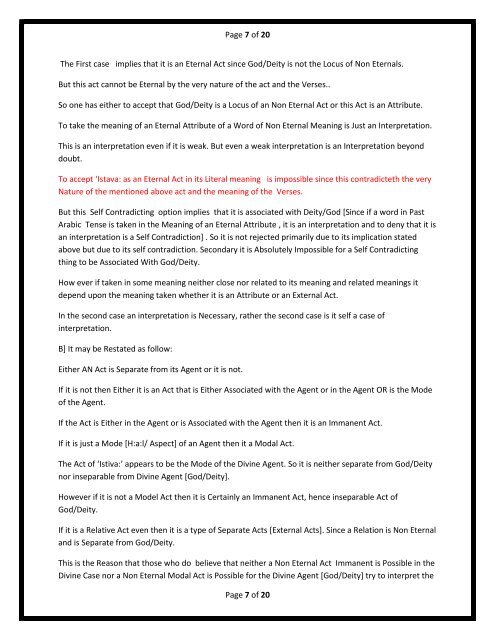Create successful ePaper yourself
Turn your PDF publications into a flip-book with our unique Google optimized e-Paper software.
Page 7 of 20<br />
The First case implies that it is an Eternal Act since God/Deity is not the Locus of Non Eternals.<br />
But this act cannot be Eternal by the very nature of the act and the Verses..<br />
So one has either to accept that God/Deity is a Locus of an Non Eternal Act or this Act is an Attribute.<br />
To take the meaning of an Eternal Attribute of a Word of Non Eternal Meaning is Just an Interpretation.<br />
This is an interpretation even if it is weak. But even a weak interpretation is an Interpretation beyond<br />
doubt.<br />
To accept ‘Istava: as an Eternal Act in its Literal meaning is impossible since this contradicteth the very<br />
Nature of the mentioned above act and the meaning of the Verses.<br />
But this Self Contradicting option implies that it is associated with Deity/God [Since if a word in Past<br />
Arabic Tense is taken in the Meaning of an Eternal Attribute , it is an interpretation and to deny that it is<br />
an interpretation is a Self Contradiction] . So it is not rejected primarily due to its implication stated<br />
above but due to its self contradiction. Secondary it is Absolutely Impossible for a Self Contradicting<br />
thing to be Associated With God/Deity.<br />
How ever if taken in some meaning neither close nor related to its meaning and related meanings it<br />
depend upon the meaning taken whether it is an Attribute or an External Act.<br />
In the second case an interpretation is Necessary, rather the second case is it self a case of<br />
interpretation.<br />
B] It may be Restated as follow:<br />
Either AN Act is Separate from its Agent or it is not.<br />
If it is not then Either it is an Act that is Either Associated with the Agent or in the Agent OR is the Mode<br />
of the Agent.<br />
If the Act is Either in the Agent or is Associated with the Agent then it is an Immanent Act.<br />
If it is just a Mode [H:a:l/ Aspect] of an Agent then it a Modal Act.<br />
The Act of ‘Istiva:’ appears to be the Mode of the Divine Agent. So it is neither separate from God/Deity<br />
nor inseparable from Divine Agent [God/Deity].<br />
However if it is not a Model Act then it is Certainly an Immanent Act, hence inseparable Act of<br />
God/Deity.<br />
If it is a Relative Act even then it is a type of Separate Acts [External Acts]. Since a Relation is Non Eternal<br />
and is Separate from God/Deity.<br />
This is the Reason that those who do believe that neither a Non Eternal Act Immanent is Possible in the<br />
Divine Case nor a Non Eternal Modal Act is Possible for the Divine Agent [God/Deity] try to interpret the<br />
Page 7 of 20


















